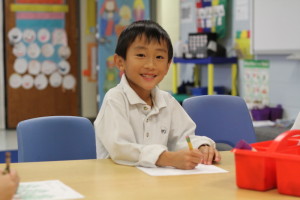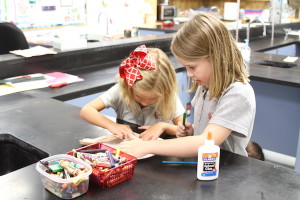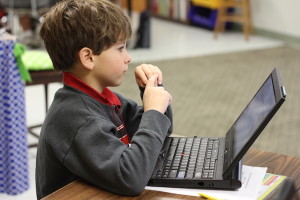
By Dr. Barry Shealy, FPD Assistant Headmaster
Eric Carle’s Very Hungry Caterpillar started by eating through an apple on Monday then two pears on Tuesday. He added a little more each day before having a tummy-unsettling junk food binge on Friday. He brought everything back together with a nice green Saturday leaf. The little caterpillar was then no longer little nor was he hungry just in time to (spoiler alert!) transform into a beautiful butterfly. This book is just one of many images that comes to mind when I think of education and child development. Any good school will have a plan to take a student where he or she is and help move the student forward along a continuum of knowledge, skills, and habits of mind. Ideally, this continuum will also lead toward a goal just as the butterfly is the end result for Carle’s caterpillar. For a college preparatory school, clearly preparation for success in college is an essential goal. For FPD, pursuit of that goal begins with students as young as three years old. This continuum from egg to butterfly may stretch as long as fifteen years.
So thinking about what college preparation looks like in elementary, we have to start with the end in mind. What are the competencies students need to realize success as they move on to college? Identifying those competencies and how they are developed allows us to design a continuous stream of experiences that begin with the youngest children and carry them to these end goals. National and state standards, research in child development, and expectations of colleges all go into this design.
Let us consider a few ideas that are especially important.
Literacy
Literacy may be th e most obvious and important set of skills to develop. I heard Michael Lindsay, President of Gordon College in Massachusetts, tell a group of Christian school administrators that his school needed students to come prepared to read and make sense of complex text and to respond and express themselves well and persuasively in writing, speaking, and discussion. Most people will recognize the importance of having students “read-read-read” and policy-makers have sometimes set guidelines for the number of words to read or incentives to increase the number of books. It is important for students to be regular readers and to find books that interest them to help this happen. However, it is also important that students read books and other texts that are challenging for them, allowing them to grow in their ability. Students also need to learn to deal with texts that they read for purposes beyond pursuing their own interests and enjoyment.
e most obvious and important set of skills to develop. I heard Michael Lindsay, President of Gordon College in Massachusetts, tell a group of Christian school administrators that his school needed students to come prepared to read and make sense of complex text and to respond and express themselves well and persuasively in writing, speaking, and discussion. Most people will recognize the importance of having students “read-read-read” and policy-makers have sometimes set guidelines for the number of words to read or incentives to increase the number of books. It is important for students to be regular readers and to find books that interest them to help this happen. However, it is also important that students read books and other texts that are challenging for them, allowing them to grow in their ability. Students also need to learn to deal with texts that they read for purposes beyond pursuing their own interests and enjoyment.
In our college preparatory elementary program, we find out where students are in their development and support their growth as any good school would. However, we also know they need to achieve a particular targeted reading level by high school to find success there and in college. They also must be comfortable and competent writing and speaking in a variety of contexts. Our curriculum and expectations are set to help students achieve and make continual progress along this trajectory by carefully selecting reading materials and levels, assigning writing and speaking practice, and establishing minimum benchmarks for each grade. Preparing students to read high school and college level literature and textbooks and have strong communication skills starts in early childhood.
 Thinking and Investigation Skills
Thinking and Investigation Skills
Basic skills and knowledge development are important in elementary school. A college preparatory elementary program must provide a strong foundation, but also go beyond these basic skills. At FPD, all students will at least complete mathematics study through the college algebra and trigonometry level with about 40% taking at least one college-level Calculus course and as many studying statistics. These studies require a great degree of abstract reasoning. Beginning very early on, we can help students develop the foundation for more abstract reasoning by developing their conceptual understanding, number sense, and reasoning and problem solving skills. In 1998, we began a shift from a traditional operation-oriented math program to our current program. The benefits of this shift included a math test score rise by as much as 20 percentiles; accelerating our students’ entrance to Algebra I by about two years; and, as these elementary students moved through our middle and high school, we saw their participation in advanced science and mathematics studies greatly increase. Students traditionally encounter several conceptual roadblocks during their mathematical development (for example, decimals in fourth grade and Algebra in middle school). The foundation our students have today has eased those transitions greatly as well as prepared students for the mathematics required in the physical sciences.
A child is born a person, created in the image of God. While recognizing that the child’s reasoning ability develops over time, we want to be careful to not underestimate the intellect of the child. We expect students to ask questions and talk about what they read. We want students to expect to explain why. We ask them to investigate the world around them. While there is much science content knowledge that can be developed, a key part of early science education is coming to know what science is – making sense of our world through exploration. Then we also expect students to understand science from a responsibility and stewardship perspective. As students participate in nature study and in investigation in the science lab and outdoor science centers, they develop the attitudes and habits of mind for success in high school and college lab science.
 Becoming an Independent Learner
Becoming an Independent Learner
Recently, one of our graduates compared high school and college teachers. From his perspective, high school teachers presented and explained content and then made you do things to learn the content. He felt college professors, on the other hand, talked to you about some of the content and then left you on your own to learn. While this perspective might be a little extreme, it is the case that a college student is expected to do a great deal of learning independently. Having taught on the college level, I know that the general rule of thumb expectation does exist that a student spend at least 2 hours studying or working outside of class for every hour in class. The development of these independent learning skills needs to take place over time. From very early on, a college preparatory program will provide students opportunity to practice and move toward independence. These skills include goal-setting and self-direction, time and task management, self-monitoring and knowing when to ask for help, and reflection on tasks. Purposeful and age-appropriate homework tasks are an important part of this development.
Grit & Other Character Trait Development
University of Pennsylvania professor Angela Lee Duckworth has been involved in research into the impact of non-cognitive character traits on achievement. Her particular area of interest is grit or resilience. She notes that independent schools have always emphasized the importance of character education. One might think about character education as making the student a better person or better citizen, but Duckworth’s point is that there are character qualities that can be developed that support a student’s achievement. Self-control, a positive response to adversity, having focus and self-direction, perseverance, and willingness to take risks are traits that a college preparatory school will give students opportunities to develop. Students should have occasion to struggle and learn how to deal with that struggle. Active and hands-on learning activities, long-term projects, community service, extra-curricular activities, and field trips all can give students opportunities to get out of their comfort zone and take risks in a safe and supportive environment.
Developing Attitudes and Habits of Mind
The most exciting part of being an educator for me is seeing students’ excitement after struggling with a challenging problem and using their knowledge and experience to reach a solution. I’ve seen this happen in a wide variety of contexts, including math and science competition, team challenge activities with our fourth and sixth graders, teaching chess to young kids, student travel both in the US and abroad, the arts, and athletics. A college preparatory elementary program should help students develop a love for learning and growing through new experiences. Studying, struggling, and committing to and follow through on tasks should become a natural part of the students’ life. A strong elementary college preparatory program also offers a range of opportunities for students to explore their interests and special gifts and abilities.
At First Presbyterian Day School, we have defined our end goals for each student in our Profile of a Graduate – a lifelong learner, challenged by the gospel, equipped for wellness, self-aware and growing, engaged and persuasive, and sensitive to others. The advantage of a 3K-12 program is that we can direct all we do educationally from the earliest ages toward these goals. A strong academic foundation and the future trajectory for achievement is best accomplished over time. Starting students early gives them the greatest opportunity for success both now and in their future years at college. Recently, I visited with two college seniors who had attended FPD beginning in kindergarten or before. Both have been very successful at a selective college and are headed off to graduate school next year. A couple of once Very Hungry Caterpillars, now beautiful FPD butterflies, off to “change the world for God’s glory.”
